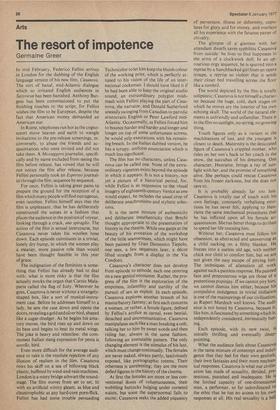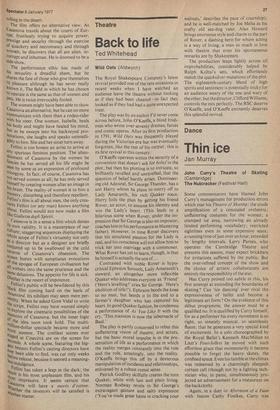Arts
The resort of impotence
Germaine Greer
In mid February, Federico Fellini arrives in London for the dubbing of the English language version of his new film, Casanova. The sort of banal, mid-Atlantic dialogue which so irritated English audiences in Satyricon has been banished. Anthony Burgess has been commissioned to put the finishing touches to the script, for Fellini wishes the film to be European, despite the fact that American money demanded an American star.
In Rome, telephones run hot as the cognoscenti move heaven and earth to wangle invitations to the pre-release screenings, or, conversely, to abuse the friends and acquaintances who were invited and did not take them. A Messaggero journalist, specifically and by name excluded from seeing the film before release, has vowed that he will not notice the film after release, because Fellini personally took an Espresso journalist through the film, sequence by sequence.
For once, Fellini is taking great pains to prepare the ground for the reception of a film which many people will find outrageous, even tasteless. Fellini himself says that the film is unpleasant, that he has deliberately constructed the scenes in a fashion that places the audience in the position of voyeur, looking through a crack, uno spiraglio. The action of the film is sexual intercourse, but Casanova never takes his woollen hose down. Each episode culminates in a trivial, lonely dry hump, in which the women play a meatier, more passive role than would have been thought feasible in this year of grace.
The indignation of the feminists is something that Fellini has already had to deal with: what is more risky is that the film actually mocks the organ that Curzio Malaparte called the flag of Italy. Wherever he goes, Casanova is never without a strangelyshaped box, like a sort of musical-instrument case. Before he addresses himself to a lady, he sets the case down and opens the doors, revealing a gold and silver bird, shaped like a sugar-dredger. As he begins his amatory moves, the bird rises up and down on its base and begins to beat its metal wings. The joke is heavy and relentless: the commonest Italian slang expression for penis is uccello, bird.
Even more difficult for the average audience to take is the resolute rejection of any illusion of realism in the film. Casanova rows his skiff on a sea of billowing black plastic, buffeted by wind-and-rain machines. London is a misty bridge athwart the soundstage. The film moves from set to set, lit with an artificial wintry gleam, as blue and claustrophobic as any hard-core porn-flick. Fellini has had some trouble persuading
Technicolor to let him keep the bluish colour of the working print, which is perfectly attuned to his vision of the life of an international cocksman. I should have liked it if he had been able to keep the original studio sound, an extraordinary polyglot mishmash with Fellini playing the part of Casanova, the narrator, and Donald Sutherland uneasily swinging from Canadian to parodic aristocratic English or Peter Lawford midAtlantic. Occasionally, as Fellini forced him to bounce harder and harder and longer and longer on top of some unfortunate actress, he would yelp execrations with his remaining breath. In the Italian dubbed version, he has a syrupy, uniform enunciation which is much less significant.
The film has no characters, unless Casanova can be called one. None of the extraordinary vignettes exists beyond the episode in which it appears. It is not a history, nor yet a picture of a historical period, for, while Fellini is as responsive to the visual imagery of eighteenth-century Venice as one would expect, he includes the usual crop of deliberate anachronisms and stylistic solecisms.
It is the same mixture of authenticity and deliberate inauthenticity that Brecht thought appropriate to the presentation of history in the theatre. While one gasps at the beauty of his evocation of the workshop of the little seamstresses, which might have been painted by Gian Domenico Tiepolo, one sees, a few sequences later, a decor lifted straight from a display in the Via Condotti.
Casanova's character does not develop from episode to episode, each one centring on a new genital encounter. Rather, the progress of the film is the exploration of the emptiness, infantility and sterility of the pursuit of sex as exploit. In each episode, Casanova explores another branch of his masturbatory fantasy; at first each concerns a woman, or rather, a female figure, defined by Fellini's artifice as carnal, even bestial, detached and uncommunicative. Casanova manipulates each like a man breaking a colt, talking her to him by sweet words and then riding her, always in the same fashion, following an immutable pattern. The only changing element is the stimulus of his lust, which must change continually. The females are never naked, always partly, lasciviously exposed, like pornographic totems. Their otherness is unrelenting; they are the most defied figures in the history of the cinema.
At first the females are more or less conventional ikons of voluptuousness, their wobbling buttocks bulging under corseted waists, but soon the supernormal fails to excite; Casanova seeks the added piquancy of perversion, illness or deformity, copulates for glory and for money, and overlays all his experience with the fatuous patter of chivalry.
The glimpse of a giantess with her attendant dwarfs saves syphilitic Casanova from suicide: he lives to find happiness in the arms of a clockwork doll. In an uproarious orgy sequence, he is spurred into a reprise by a hunchbacked girl from an opera troupe, a reprise so violent that it sends their closet bed travelling across the floor like a tumbril.
The world depicted by the film is totally solipsistic ; Casanova is not himself a character because the huge, cold, dark stages on which he moves are the interior of his own echoing skull. The world of the natural elements is unfriendly and unfamiliar. There is in the film no sunlight, no spring, no growing thing.
Youth figures only as a variant in the machinations of lust, and the youngest is closest to death. Maternity is the desiccated figure of Casanova's crippled mother, who rides on her son's back to her coach in the snow, the succubus of his dreaming. One character, Henriette, brings a ray of sunlight with her, and the promise of something alive. She perhaps could rescue Casanova from his frozen darkness, but she does not care to.
It is probably already far too late. Casanova is totally out of touch with his own feelings, constantly verbalising emotions he has never felt, applying to Henriette the same mechanical procedures that he has inflicted upon all his female acquaintances. She has better things to do than to spend her life rescuing him.
Without her, Casanova must follow his obsession, as abstracted and unswerving as a child sucking on a filthy blanket. He freezes into a useless old age, with neither chick nor child to comfort him, but we are not given the easy escape of pitying him. The techniques of alienation all work against such a painless response. His painted face and preposterous wigs are those of a pretentious popinjay. If we cannot pity him, we cannot dismiss him either, because his compulsive indulgence in trivial titillation is one of the mainsprings of our civilisation, as Rupert Murdoch well knows. The audience is not bored by Casanova, because it, like him, is fascinated by something which is, independently considered, intrinsically bor
ing. •
Each episode, with its new twist, is initially thrilling and eventually disappointing.
What the audience feels about Casanova is the same mixture of contempt and indulgence that they feel for their own genitals, their own fantasies and their more mechanical responses. Casanova is what our civilisation has made of sexuality, derided, pretentious, punished and inadequate. He is the limited capacity of one-dimensional man, a performer, so far subordinated to the ethic that he has no access to his own responses at all. His real sexuality is a bell
tolling in the desert.
The film offers no alternative view. As Casanova travels about the courts of Eurone, fruitlessly trying to acquire power, Prestige and security through the exercise of quackery and necromancy and through Women, he discovers that all are alien, incorrupt and inhuman. He is doomed to be a side-show.
The performance ethic has made of his sexuality a dreadful sham, but he shares the fate of those who give themselves to pleasure although he has never really known it. The field in which he has chosen 10 operate is the same as that of women and Pets. He is twice irrevocably fooled. The women might have been able to show Casanova an alternative, but he can no more cornmunicate with them than a rodeo-rider With his steer. One woman. Isabelle, heals his body and might have healed his mind, but as he sweeps into his hackneyed protestations, she laughs and speaks unintelligibly to him. She and her sister turn away. Fellini is too honest an artist to arrive at any spurious feminist position. The abandonment of Casanova by the women he fancies he has served all his life might be seen by some as an expression of profound Misogyny. In fact, of course, Casanova has Lti°t served women at all ; he has only served ii'iniself by creating women after an image in 'Is brain. The reality of women is to him a ihYstery, disturbing and therefore repellent. ell's film is all about men, the only creatures Fellini (or any man) knows anything auo Fellini would not now make a film like Giutietta degli Casanova is in a sense a film which denies Its own validity. It is a masterpiece of our culture; staggering sequences displaying the whole scope of Fellini's virtuosity not only as a director but as a designer are briefly ccinlured up to be swallowed in the cold caverns of Casanova's obsession. The se:een bursts with sumptuous evocations °I, the apogee of European civilisation but all withers into the same prurience and the st,anie delusions. The appetite for life is sick.
'sPlay is the resort of impotence.
b, rellini's public will be bewildered by this ack film coming hard on the heels of v"iarcord. Its nihilism may seem mere perikersitYWhen he asked Gore Vidal to write .fie script, Fellini may have wanted simply 1.° explore the cinematic possibilities of the nernoirs of Casanova, but the inner logic the idea soon took hold. The multi11111110n-dollar spectacle became more and s,Ore austere. The costliest scenes ever setaged at Cinecitta are on the screen for conds. A whole scene, featuring the bige6eSt breasts Fellini's casting directors have beve,r been able to find, was cut only weeks
1ore release, because it seemed a meaning SS indulgence
elli has taken a leap in the dark ; the eicsult is his most unpleasant film, and his t)st impressive. It seems certain that will have a sueces d'estime. ether the investors will be satisfied is riOther matter.



































 Previous page
Previous page